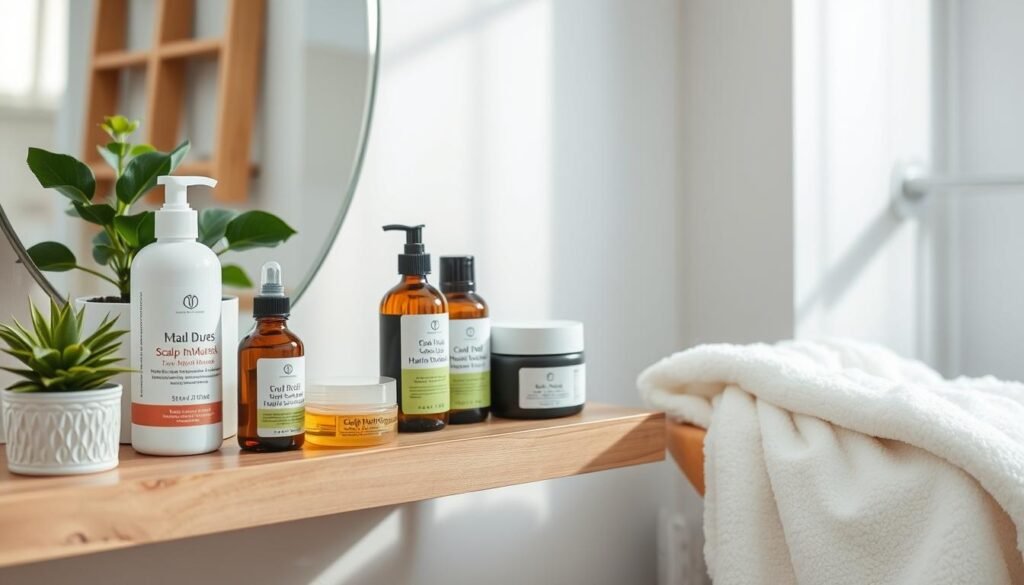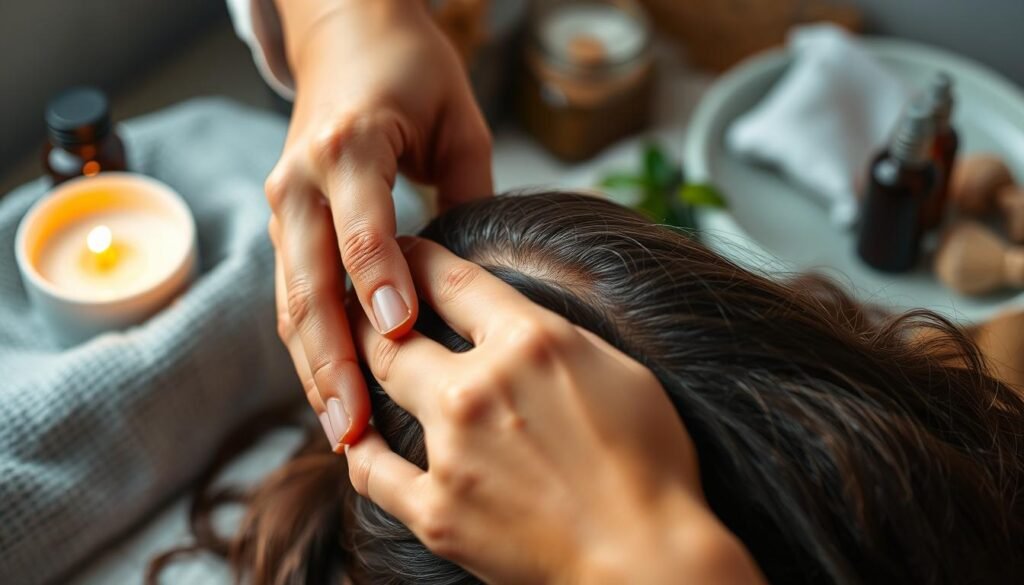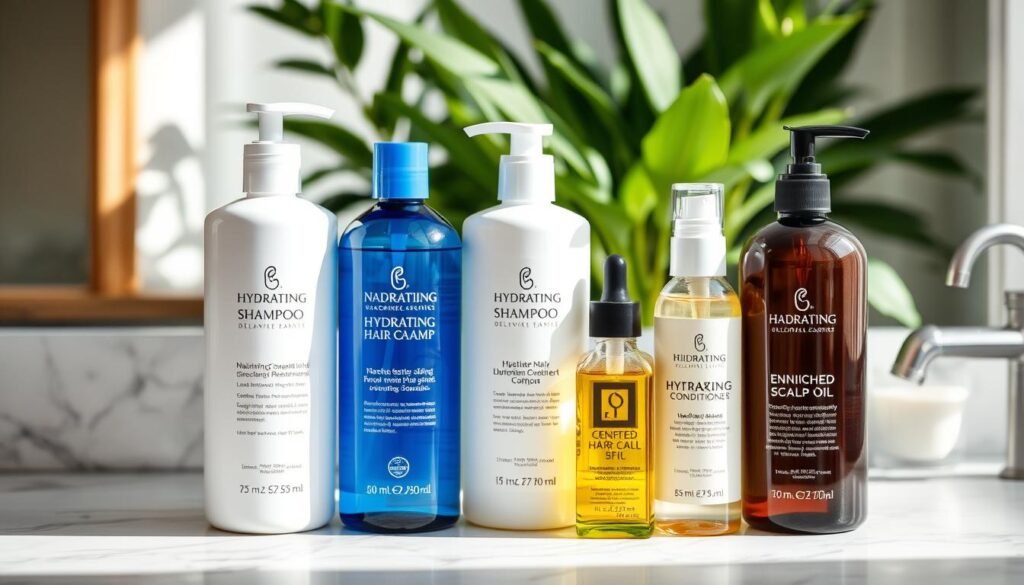Did you know about half of people worldwide experience dry scalp at some point? This condition can cause itching, visible flakes, and irritation. It can really affect how confident and comfortable you feel. To effectively treat dry scalp, you must understand its causes. Then, apply simple solutions for relief. Factors like changes in the environment or using the wrong hair products contribute to dry scalp. So, it’s key to develop a good scalp care routine for lasting results. This article will look at ways to treat dry scalp. We’ll discuss home remedies and moisturizing techniques to improve your scalp’s health.
Key Takeaways
- Dry scalp affects many individuals, leading to discomfort and visible flakes.
- Essential oils like coconut and tea tree oil can provide effective hydration and relief.
- Aloe vera and olive oil are known for their moisturizing properties.
- Identifying the root cause is essential for choosing the right dry scalp treatment.
- A proper scalp care routine is vital for alleviating symptoms and maintaining scalp health.
- Consulting a professional is recommended for severe or persistent cases.
Understanding Dry Scalp and Its Causes
Dry scalp can affect anyone, for many reasons. One common cause is changing weather and lower humidity, especially when it gets cold. Indoor heating in winter can make this worse. Also, harsh hair care products can remove important oils from your scalp, harming its health.
Skin issues like seborrheic dermatitis, psoriasis, and eczema also lead to dry scalp. They can cause itching and scaly patches. It’s best to wash your hair no more than once every two days to keep these problems at bay.
Dry scalp can come from both internal and external sources. Internal factors include Atopic Dermatitis, hormonal shifts, and genes. On the other hand, a poor diet, smoking, certain meds, and pollution are external culprits. Even the change of seasons can make your scalp uncomfortable.
Staying hydrated helps fight off scalp dryness and boosts skin health. Special products like Nexxus Scalp Inergy, with its Foam Shampoo and Ultralight Conditioner, are made for dry scalp care. Eucerin DermoCapillaire products also ease itching and dryness effectively.
| Causes of Dry Scalp | Internal Factors | External Factors |
|---|---|---|
| Weather changes | Skin conditions (e.g., psoriasis) | Poor diet |
| Harsh hair care products | Hormonal changes | Smoking |
| Overwashing hair | Genetic predisposition | Environmental pollution |
| Indoor heating | Age-related dryness | Seasonal temperature changes |
Common Symptoms of Dry Scalp
It’s important to know the common signs of a dry scalp for good care. Many face constant itchiness, which is uncomfortable. Another key sign is flaking, which leads to tiny, dry flakes showing on clothes or shoulders. Depending on the person, these symptoms can be mild or very bothersome. This makes quick action crucial.
Sore spots can form if one scratches their head a lot. If scratching keeps up, it might even cause hair loss. This can really affect how one feels about themselves. It’s tricky to tell dry scalp apart from dandruff because both cause flaking. However, dandruff flakes are bigger and oily, unlike the smaller, drier flakes of dry scalp.
People older than 40 or in certain jobs, like nursing or hairdressing, have a higher chance of dry scalp. This is due to either aging or often getting their hair wet. If you’re dealing with these signs, think about drinking more water and using kinder hair products. This can help ease the discomfort.
How to Treat Dry Scalp: Simple Solutions That Work
To treat a dry scalp, start by understanding its causes. Factors like the microbiome, environment, and genetics play big roles. It’s important to have a balanced hair care routine. This lets you find dry scalp solutions that fit your life easily.
One good way to treat dry scalp is by washing your hair just right. Washing too much or too little can make dryness worse. Try using scalp treatments three times a week for a month to see changes.
- Switching to a gentle, sulfate-free shampoo helps keep moisture.
- Using oil treatments on your scalp brings back hydration and cleans out buildup.
- Drinking more water helps make your scalp healthier and more hydrated.
- Eating less sugar and more Omega-3 fatty acids helps with scalp hydration.
- Seeing a dermatologist regularly helps get customized treatment, especially for dandruff or psoriasis.
Seasons affect your scalp health; summer heat and winter cold can be tough. A humidifier at home can balance out humidity effects. It’s also crucial to protect your scalp from too much sun to prevent dryness and damage.
Following these steps can greatly improve your scalp health. Staying consistent and choosing the right products will give you a balanced, hydrated scalp.
Scalp Care Routine for Moisturizing
Caring for your scalp is key to fighting dryness and boosting scalp health. Using good moisturizing methods lays the groundwork for hydration that lasts. Let’s go over some ways to improve your care routine.
Choosing the Right Shampoo
It’s vital to pick the right shampoo for dry scalp problems. Choose ones without sulfates or harsh ingredients. They keep your natural oils and add moisture. Moroccanoil and Briogeo are top brands for dry scalp relief.
Conditioning Techniques
Conditioners are crucial for adding moisture to your hair. Use leave-in conditioners or deep conditioning masks to hold moisture better. These products, applied after shampooing, help retain moisture and protect against dryness. Ingredients like argan oil, shea butter, or aloe vera can boost hydration.
Importance of Water Temperature
The water temperature matters a lot when you wash your hair. Warm water cleans well without removing too much moisture. Cold water can seal hair cuticles but may not clean as effectively. Using warm water helps keep your scalp moisturized properly.

| Product Type | Key Benefit | Recommended Ingredient |
|---|---|---|
| Shampoo | Gentle cleansing | Sulfate-free |
| Conditioner | Moisture retention | Aloe vera |
| Leave-in Treatment | Extra hydration | Argan oil |
| Scalp Scrub | Flake reduction | Tea tree oil |
Natural Remedies for Dry Scalp
People often use natural remedies to soothe dry scalp. These solutions tap into nature’s healing powers, making them popular. Each one offers unique benefits, tailored to individual scalp care needs.
Coconut Oil for Hydration
Coconut oil is known for its excellent moisturizing ability. It hydrates and fights fungus, reducing dandruff. Using it nourishes your scalp and boosts hair health.
Tea Tree Oil Benefits
Tea tree oil is a great choice for natural scalp care. It fights fungi and cleanses, making your scalp healthier. It decreases itchiness and improves scalp condition significantly.
Aloe Vera for Soothing
Aloe vera is famous for its calming effects on the skin. Applying its gel to your scalp can reduce inflammation and moisturize. It’s perfect for maintaining a healthy scalp.
Using Apple Cider Vinegar
Apple cider vinegar has antimicrobial qualities that help clean the scalp. A diluted rinse gently exfoliates and balances pH levels. It’s effective in removing dead skin and promoting healthy hair.
| Natural Remedy | Benefits |
|---|---|
| Coconut Oil | Moisturizes and fights fungal growth |
| Tea Tree Oil | Reduces irritation and itchiness |
| Aloe Vera | Soothes inflammation and hydrates |
| Apple Cider Vinegar | Clarifies and balances scalp pH |
Scalp Massage Techniques for Dryness
Scalp massages offer numerous benefits for those suffering from dryness. They improve blood circulation, important for scalp health. With scalp massage for dryness, you can encourage a healthier scalp and reduce discomfort.
Massage techniques can vary. Use gentle circular motions and fingertip kneading to spread your scalp’s natural oils. This promotes moisture retention and hair growth. Making scalp massages a part of your hair care routine is beneficial.
These techniques also help relieve stress. Stress can make dryness worse and irritate your scalp. A relaxing scalp massage can make self-care more enjoyable.
To begin, try these simple techniques:
- Circular Motions: Make small circles on your scalp with your fingertips.
- Kneading: Gently knead your scalp like dough.
- Hair Twists: Twist hair sections gently to awaken the scalp.
These habits improve scalp health and hydrate through stimulation. Using these methods can improve your scalp’s health and assist in dealing with dryness.
For more insights on treating a dry scalp, consult experts. Check out guides on effective remedies for more information.

| Massage Technique | Description | Benefits |
|---|---|---|
| Circular Motions | Using fingertips to create small circles on the scalp | Increases blood flow and releases tension |
| Kneading | Gently pressing and rolling sections of the scalp | Helps distribute natural oils and promote relaxation |
| Hair Twists | Twisting hair segments between fingers | Stimulates the scalp while providing hydration |
Anti-Dandruff Shampoos: What to Look For
Looking for the right anti-dandruff shampoo is key when you have a dry scalp. Ingredients like Pyrithione Zinc, ketoconazole, and salicylic acid are top picks. They tackle the root causes of dandruff, helping stop itching and flaking.
Head and Shoulders Dry Scalp Care Shampoo stands out for dry scalp relief. It promises up to 100% protection against dandruff. With almond oil, it fights dryness and makes your hair feel great. This paraben-free choice is often picked by dermatologists to manage redness, oiliness and flakes.
The following table showcases important anti-dandruff shampoos and their features:
| Product Name | Active Ingredients | Benefits | Average Price |
|---|---|---|---|
| Head and Shoulders Dry Scalp Care | Pyrithione Zinc (1%) | Up to 100% dandruff protection, soothing itch, and reducing irritation | $8.97 for 13.5 Oz |
| Sachajuan Scalp Shampoo | Salicylic Acid, Rosemary Oil | Targets thin, breakage-prone hair while treating dandruff | $17 for 3.38 Oz |
Knowing how to follow the label instructions on anti-dandruff shampoos is important. Different shampoos work in various ways. Talk to a dermatologist for advice that fits your scalp’s needs. Picking the right shampoo can make treating dandruff easier and improve your hair and scalp health.
Hydrating Hair Products Recommendations
Finding the right hydrating hair products is key for fighting dryness and better scalp health. Using products with certain ingredients can really boost your moisture game. Look for hyaluronic acid, jojoba oil, and vitamin E for keeping moisture, making hair feel and look hydrated.
Best Ingredients for Moisture
For dry scalp, these ingredients are game changers:
- Hyaluronic acid: Super good for hydration.
- Glycerin: Pulls water to hair and scalp.
- Shea butter: Gives deep hydration and nourishment.
- Cocoa butter: Keeps moisture and makes hair soft.
- Panthenol: Better hair elasticity and moisture.
How to Use Hydrating Products Effectively
To get the most out of hydrating products, here’s what to do:
- Put hydrating products on damp hair to lock in moisture.
- Gently massage scalp treatments in for good ingredient absorption.
- Use hydrating masks or treatments weekly for extra moisture.
- Wash with lukewarm water, since hot water can take away moisture.
- Try products like the Dove DermaCare Anti-Dandruff Shampoo for good, affordable options.

Trying different products helps find top moisturizers. The Bumble and Bumble Seaweed Shampoo is a top pick. Also, the Dove Dermacare Scalp Dryness and Itch Relief Anti-Dandruff Shampoo is great for tight budgets at $5. Both can really help your hair care routine, offering both quality and affordability.
Consulting Professionals for Severe Cases
When home treatments for dry scalp don’t work, it’s time to seek professional help. A dermatologist has the skills to find and treat any deeper issues. They deal with various skin conditions, like seborrheic dermatitis and psoriasis. These conditions can greatly impact scalp and skin health.
When to See a Dermatologist
If dry scalp problems don’t go away or get worse, see a dermatologist. You should get help if you notice:
- Persistent redness or irritation
- Severe itching that interrupts your day
- Flaking or peeling skin that over-the-counter treatments can’t fix
- Changes in hair texture or more hair loss
Learning about dermatology can be key to tackling these issues. Getting help early can prevent worse problems and help keep your hair healthy.
Possible Medical Treatments
A dermatologist might offer different treatments based on your needs. Some options might include:
| Treatment Type | Description |
|---|---|
| Topical Antifungal Agents | These tackle seborrheic dermatitis by slowing yeast growth on the scalp. |
| Medicated Shampoos | These shampoos have special ingredients, like salicylic acid or ketoconazole, to reduce symptoms. |
| Corticosteroids | These can lessen inflammation and help with itching and irritation. |
| Lifestyle Adjustments | Making changes in stress management, diet, and how you care for your scalp can help treatments work better. |
Using these treatments can help control dry scalp better. For more info on your condition and treatments, check out Nizoral’s expert advice and Zen Your Vibes.
Conclusion
To treat a dry scalp well, it’s important to know what causes it. You also need to spot the signs early. Using both natural and store-bought products helps a lot. Using kind shampoos, helpful oils, and good scalp routines will make your scalp better over time.
Keep taking care of your scalp regularly. If your scalp stays dry or hurts, see a doctor. A skin doctor can make a plan just for you, making sure you get the best help. Looking at your life, like stress and what you eat, can also help your scalp.
Having a full plan that stops and fixes scalp issues is key to a healthy scalp. To learn more about scalp problems like seborrheic dermatitis and how to treat them, click here. Knowing more and taking action will make you feel better and more confident every day.